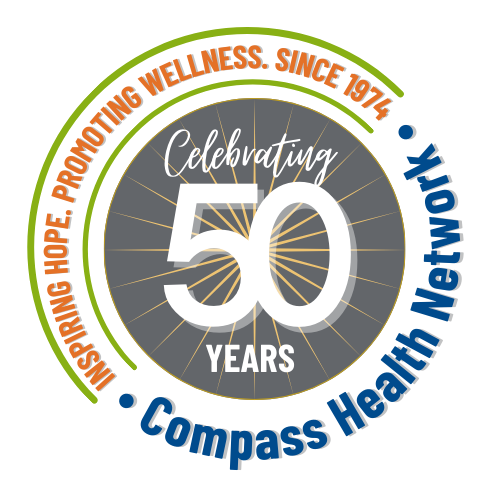Cultural Humility: Language Matters
Amy Meriweather, Ph.D. is a licensed psychologist with experience in community mental health, primary
care settings, private practice and consultation with agencies that provide services to specialized populations. She has created curriculum for professionals to use with differently abled individuals to help with understanding their rights, bodies, relationships and sexuality. Dr. Meriweather enjoys working with individuals and families from a variety of backgrounds and presenting issues. She loves to travel and be a stranger in lands different from her own as it helps her to recognize and enjoy the fuller extent of others’ being.
Darla Young is the Director of Diversity, Equity, Inclusion and Belonging at Compass Health Network. She holds a master’s degree in Organizational Psychology as well as an Inclusive Workplace Culture credential from the Society for Human Resource Management. Darla is responsible for leading an active Accessibility and Inclusion Committee and multiple subcommittees with a focus on achieving defined strategic goals relevant to DEI efforts. With a focus on nurturing a culture where employees can bring their authentic selves to work each day, Darla works with leaders to shape a framework to increase ability to engage employees in an inclusive culture.
Contact Jennifer Frye at jfrye@compasshn.org with questions or to request accommodations.
There is no known commercial support for this program.
February 24, 2023
1:30 p.m.—3:300 p.m.
Virtual via Cvent
Link to Join Included in Confirmation Email
Cost: $25.00
2 CE credits are available for attendees
present for the entire program.
Completion of the post-program course
evaluation is encouraged.
Learning Objectives:
- Discover three ways to practice cultural humility in clinical practice
- Learn three principles of cultural humility
- Identify four ways to increase inclusive language
- Implement three skills to communicate strength-based, person-centered language
- Design a plan to engage clients from different cultures
Compass Health Network is approved by the American Psychological Association to sponsor continuing education for psychologists. Compass Health Network maintains responsibility for this program and its contents.
1800 Community Drive
Clinton, MO 64735
(844) 853-8937

Psychiatry: Transcranial Magnetic Stimulation
Psychiatry: Transcranial Magnetic Stimulation
What is rTMS?
The rTMS stands for repetitive transcranial magnetic stimulation. It is not a completely new technology. It has been used in research, scientific fields, and in the field of neurosurgery for quite a long time.
It is used to treat patients with depression who are not responding to medications alone in an adequate manner.
What is it licensed for?
It is an approved treatment for major depressive disorder. Some of the other experimental indications for rTMS include treatment resistant OCD, hallucinations, and seizure disorders. However, major depressive disorder is currently the most established psychiatric indication. It is also used for mapping the brain during surgical procedures and during research.
Is it suitable for everyone?
Like any other treatment, it is not suitable for everyone, and your physician, with your help, can make that decision. It is not suitable for people with certain type of magnetic materials implanted in their body due to risks with magnetic field. It is not generally suitable for people with seizures.
How is it given?
It is an office based procedure that is administered 5 times a week. Patients can drive themselves to the office, and it is administered by either the treating physician or the appropriately trained TMS technician. At the first visit, provider will establish the parameters of treatment such as the strength of the magnetic field required, width and frequency of the magnetic pulse, and the position of the magnetic coil. After the initial visit, magnetic coils can be placed in the preset position and treatment administered on a daily basis. Each treatment session lasts between 10-30min based on various parameters. Patients can drive home after the procedure. Sessions are generally limited to around 30 minutes and modified based on response.
How does it work?
Magnetic fields induced by coil generate small electric signals in the brain matter underneath the coil. These electrical signals modify the connections between neurons and this in turn improves the mood.
Potential complications and side-effects of TMS
Common but mild side-effects include headaches, discomfort at the site of coil placement, and discomfort due to clicking noise produced by the machine. Rare side-effects may include seizures. It is very uncommon for this to happen and may result in termination of further sessions. Seizure risk from rTMS is similar to antidepressant therapy.
What next?
rTMS is a time limited therapy. Your provider will discuss with you regarding longer term plan of medication management as well.
Occasionally some patients are given maintenance sessions where rTMS is continued for much longer than the usual 30+ sessions depending on the individual needs.
Compass Health Network’s New Partnership with The Food Bank
The Food Bank and Compass Health Network Announce Partnership, Healthcare Tenancy in New Central Pantry Location
The Food Bank for Central & Northeast Missouri and Compass Health Network are announcing a new partnership that will install Compass Health Network as a tenant in the new Central Pantry location on the Business Loop. Central Pantry is owned and operated by The Food Bank, and the new location is currently under renovation with plans to open later in the fall. To help provide community members with access to healthcare services in a convenient location, Compass Health Network will begin operating preventive and primary healthcare services out of the new Central Pantry location at that time.
The existing Central Pantry on Big Bear Boulevard provides food at no cost to around 10,000 Boone County residents each month. The new location will offer a larger and more accessible retail space with a grocery store-like atmosphere; a demonstration kitchen for nutrition education and training; and a 1,108 square foot healthcare tenant space built to Compass Health Network’s specifications to best serve the needs of our community.
“Food insecurity is often coupled with other challenges, including lack of access to healthcare,” said Karen Cade, VP of Corporate Services, Central Region, for Compass Health Network. “Since Compass Health Network is dedicated to engaging and empowering communities, partnering with The Food Bank to support whole-person wellness and reduce barriers to access is a natural progression of our work. We can’t wait to begin service alongside this important community resource that will transform healthcare efforts – as well as hunger action – in our area.”
Compass Health Network utilizes a sliding fee program to reduce barriers to those accessing health services. While neighbors utilizing the clinic will be charged for care, those who qualify will benefit from Compass Health Network’s reduced fees. Compass Health Network and other community partners will also offer screenings, vaccinations and other preventive healthcare measures at no cost during planned events throughout the year.
“Food is the foundation for so many aspects of life, including health and wellness,” said Lindsay Young Lopez, President and CEO of The Food Bank. “While our new Central Pantry location will act as a hub for hunger action in Boone County, we’re looking forward to nurturing programming that better nourishes the whole person. We are so grateful to enrich the offerings available to our neighbors with this new Compass Health Network partnership.”
The agreement between The Food Bank and Compass Health Network secures Compass as a tenant in the new Central Pantry for the next five years. In addition to healthcare, the new Central Pantry location will host a number of other visiting services that will bring much-needed support to neighbors, including information on Medicaid, SNAP, health insurance, utilities assistance, legal support and more.

Does Medicaid Cover Dental Care for Adults?
Does Medicaid Cover Dental Care for Adults?
Medicaid is part of the safety net that protects America’s most vulnerable citizens. It provides health coverage for nearly 85 million eligible American adults and children.
There are many aspects of health care that are overlooked. Dental care is one of those areas, and neglecting it results in poor health outcomes.
The good news is that many states have adopted Medicaid expansion programs that include dental coverage for both children and adults.
Read on to answer the question: does Medicaid cover dental care for adults in Missouri? Explore topics such as why oral hygiene is important and using Medicaid to achieve a beautiful smile.
Why Is Dental Care Important?
Routinely going to the dentist is about more than fresh breath and white teeth. Instead, medical researchers understand that oral hygiene improves your overall health.
For starters, your dentist ensures that you do not have any signs of oral cancer. Many people are surprised to learn that there is a link between plaque and heart disease. Plaque serves as a host to harmful bacteria.
This bacteria can yield a fatal disease called bacterial endocarditis. Here, heart valves and the lining of the heart become enlarged. Bacteria found in plaque also contribute to chronic obstructive pulmonary disease (COPD).
Did you know that dental patients with diabetes are at greater risk of oral health issues? Gum disease is a common outcome when your body can no longer adequately maintain blood sugar levels. This ultimately leads to bone and tooth loss.
There is also a link between oral health and osteoporosis. Dental patients with osteoporosis often experience bone loss in the jaw and gum disease. Without regular visits to the dentist, you are vulnerable to losing teeth.
Does Medicaid Cover Dental Care for Adults in Missouri?
Missouri’s Medicaid program does cover dental care for both children and adults. This means that you can go to a dental provider like Compass Health Network that accepts Medicaid.
This is exciting news and gives you access to preventative and restorative dental care. On the preventative side, you can get X-rays, fluoride treatments, and cleanings. As we mentioned earlier, removing plaque eliminates dangerous bacteria from moving to the heart and lungs.
Medicaid also covers restorative dental care. If you have a cavity, for example, you may need a filling or sealant.
In more extreme cases, the tooth is beyond saving. The dentist will recommend a tooth extraction. This procedure is also covered by Medicaid.
Crowns and bridges are required when a tooth is significantly damaged or lost. When many teeth fall out, dentures are a potential solution. Fortunately, Medicaid provides protection for all these dental procedures.
Your Guide to Medicaid Dental Coverage in Missouri
Frequently seeing a dentist is imperative to maintaining healthy teeth and gums. Dental care for adults is now possible in Missouri and you can receive preventative or restorative care.
This means you can use Medicaid for your 6-month checkup or for getting a cavity filled. If you are still asking does Medicaid cover dental care for adults, contact us today to speak with a medical biller.

How to Manage Mental Health Symptoms
How to Manage Mental Health Symptoms
Do you find yourself struggling with mental health or do you have a loved one that is suffering?
You and your family aren’t alone. In fact, millions of people struggle with mental health issues their entire lives.
Mental health symptoms can manifest in various ways, such as anxiety, depression, and mood swings, among others. These symptoms can impact an individual’s daily life, work, relationships, and overall well-being. Fortunately, it’s possible to manage symptoms with the right approach.
Here we discuss some tips for managing mental health symptoms. Keep reading to learn more.
Identify Your Triggers
The first step in managing mental health symptoms is identifying your triggers. Triggers are situations or events that can exacerbate your symptoms. For instance, if you have social anxiety, crowded spaces may be a trigger for you. Identifying your triggers can help you avoid them or prepare for them.
Try to keep a journal of situations that trigger your symptoms. Over time, you’ll be able to identify patterns and develop coping strategies for improving your mental wellness.
Seek Professional Help
If you’re experiencing mental health symptoms, it’s crucial to seek professional help. Mental health professionals can provide a diagnosis, develop a treatment plan, and offer guidance and support.
You can seek help from a therapist, psychiatrist, or counselor. You can also consult your primary care physician or a trusted friend or family member for recommendations.
Practice Self-Care
Self-care is an essential aspect of managing mental health symptoms. Self-care activities can help reduce stress, boost your mood, and improve your overall well-being. Self-care activities could include exercise, getting enough sleep, practicing mindfulness, or engaging in a hobby you enjoy.
Make it a priority in your daily routine. Keep in mind that self-care is necessary for good mental health.
Build a Support Network
Having a support network is crucial for managing mental health symptoms. Your support network could include family members, friends, or mental health professionals. It’s essential to have people in your life who you can talk to and rely on for support when you’re struggling.
If you don’t have a strong support network, consider joining a support group. You could also connect with others through online forums or social media. Many communities and resources are available for people with mental health conditions.
Practice Mindfulness
Mindfulness is a technique that can help you stay present in the moment. It can reduce feelings of anxiety and stress. Techniques include mindfulness meditation, deep breathing exercises, or simply taking a few minutes to focus on your senses and surroundings.
Practice mindfulness regularly, even if it’s just for a few minutes each day. It can help you feel more grounded and centered, which can reduce the impact of mental health symptoms.
Consider Medication
If your symptoms are severe, you may benefit from medication. Medication can help alleviate symptoms such as anxiety or depression. However, medication should always be taken under the guidance of a mental health professional.
Tips for Anyone Struggling with Mental Health
It’s no secret that anxiety and depression can make it difficult to have a happy and healthy lifestyle. Fortunately, this guide to tips for anyone struggling with mental health show that the help you need is within reach.
Please contact us today to learn how the professional at Compass Health can help you find the mental health resources that can improve your quality of life.

Which Health Services Are a Part of Primary Care?
Which Health Services Are a Part of Primary Care?
Did you know that a growing number of Americans are declining primary care? According to a recent survey, more than 100 million Americans are not seeing a primary care physician (PCP). Even more alarming is that roughly 25 million are children.
This means that these individuals are putting off preventative medicine. Instead, they are reactive and waiting to get sick. Ultimately, this leads to negative health outcomes and costlier bills.
Read on for a comprehensive guide to primary health care. Explore what health services are included in primary care and why family medicine is so important to overall health.
What Is Primary Health Care?
A PCP is a medical doctor that handles your overall health. PCPs are also synonymous with family medicine. Many families visit the same doctor together, whether they are an adult or a child.
PCPs see patients for common illnesses. If you have the flu or an infection, a PCP is your first line of defense.
After an evaluation, the PCP determines if they can treat you or if a specialist is necessary. In cases where a specialist is necessary, your PCP refers you to another doctor or practice.
PCPs also handle your preventative health care. They are responsible for following the recommended vaccination schedule.
In children, they check weight and height to make sure the child is growing properly. Vaccinations are administered at the PCP’s office.
Topics like behavioral health and even dental care are covered at your regular checkup. The point is to pre-emptively identify any issues and direct the family to a specialist that can treat it.
What Health Services Are Offered by Your Primary Care Physician?
PCPs are like a jack of all trades in the medical community. They are responsible for your overall health and have vast knowledge of the human body.
If you’re sick with bacterial or viral ailments, a PCP can help. They check your heart, lungs, ears, and throat to find the potential cause.
Your PCP is going to order blood work as part of your preventative care. Here, they check your glucose levels and to make sure your cholesterol is normal. If they find something abnormal, the doctor may prescribe prescription drugs or refer you to a specialist.
They also test for viral illnesses like influenza or Covid-19. To prevent these viruses from taking root, your PCP administers vaccinations and booster shots each year.
PCPs also help you manage chronic conditions. For instance, your family doctor helps you deal with diabetes on a daily basis or even achieve weight loss goals.
As a result of this focus on overall health, there is a direct link between PCPs and life expectancy. The supply of 10 new PCPs in the United States improves life expectancy by more than 51 days.
Your Guide to Primary Health Care
You now understand the importance of primary health care. Regularly seeing a PCP is proven to improve your life expectancy and help your overall health.
If you find yourself interested in seeing a primary care physician in Missouri, contact us today to schedule an appointment.

May is Mental Health Awareness Month: Everything You Need to Know
May is Mental Health Awareness Month: Everything You Need to Know
Over the past few years, the world has preoccupied itself with physical health. While that’s no wonder considering the pandemic, a new shift is here. Now, it’s time for us to all collectively focus on our mental health.
Since May is Mental Health Awareness Month, it’s a great time to get started. This month, make an effort to improve upon your existing mental health education. Get informed about common issues, and learn more about improving mental health, too.
If you don’t struggle yourself, then you can still use your knowledge to help someone else. Read on to get informed and learn more about how you can help celebrate this month by helping someone you love!
Common Mental Health Issues
One of the best ways to take advantage of mental health awareness month is to educate yourself. Mental health issues might seem like something on the fringe, but they’re not. In fact, the pandemic increased anxiety and depression diagnoses by 25% worldwide. That means that many of us know someone who is struggling, even if we’re not aware of it.
Here are some of the most common mental health issues to be aware of:
- Anxiety
- Depression
- PTSD
- ADHD (attention deficit hyperactivity disorder)
- OCD (obsessive-compulsive disorder)
- Bipolar disorder
If you’re currently in a crisis or you know someone who may be, Call 988. This suicide & crisis lifeline can help.
Improving Mental Health One Step at a Time
Finding help when you’re struggling mentally is paramount. Without help, mental health issues can lead to a host of other problems. For instance, if you have untreated anxiety, then you might try to self-soothe with drugs. Over time, this can turn into an addiction and even a substance use disorder. Improving mental health starts one step at a time. Do something that makes you feel good. Then, do something else! Don’t stop investing in yourself.
Celebrating Mental Health Awareness Month
Celebrating this month should start with your education. Then, you’ll want to use that information to your advantage to improve your own mental health. Don’t stop there, though! Keep going by helping others, too. Equipped with what you know, you can help others who are suffering. Simply saying something kind to someone else can do wonders. Do something nice, and you’ll improve not only your own mental health but someone else’s, too!
Take Advantage of Mental Health Awareness Month
This May, we’re asking all our readers to take advantage of mental health awareness month. You can expand your foundation of knowledge and improve your own mental health. By doing so, you’ll be making the world a better place. You’ll also be helping those around you, too. If you know someone who is struggling, then do your best to be understanding.
Are you interested in celebrating this month by supporting mental health programs?
Consider making a donation to Compass Health Network today! You’ll be helping to serve communities throughout Missouri.

Everything You Need to Look for When Selecting a Primary Care Doctor
Everything You Need to Look for When Selecting a Primary Care Doctor
Did you know that the United States has the lowest life expectancy among other wealthy nations? On average, Americans are dying at 76 years old. In comparable countries, people are living to at least 82 years old.
One reason is that many Americans are forgoing primary care. A recent report concluded that roughly 100 million Americans do not see a primary care doctor.
You can stay on top of your health by visiting a primary care physician (PCP). Read on to learn about selecting a primary care doctor. Explore tips on how to get the best primary care experience and review options for doctors.
Search Online
You can start your search for a PCP on the internet. Both social media and internet search engines are powerful tools for finding doctors.
Here, you can locate board-certified primary care doctors that offer services near you. In Missouri, for example, you will find health providers like Compass Health Network.
Once you locate a PCP, make sure that they are considered in-network for your health insurance. Reading online patient reviews is also an important step in the process.
You want to select a doctor that is reputable and receives largely positive feedback from the community. While not every client is going to be satisfied, you want to make sure that most are happy.
Verify Credentials
It is wise to verify your health provider’s credentials. You can often do this by reviewing the doctor’s or health network’s website.
The typical physician website has an “About Us” landing page. Select this and learn more about the doctors at the practice.
You can explore where the doctor attended medical school and how long they have been in practice. For larger medical networks, you can research multiple doctors and select one that is most compatible with your preferences.
Compare Costs
Comparing treatment costs is another important step in the process. There are a number of variables that affect the patient’s financial responsibility.
The patient’s health insurance is the primary determiner of cost. Some patients have employer-based insurance, while others use government programs like Medicaid or Medicare.
The best medical providers try to reduce barriers to access. There are still many Americans without health insurance that require care.
For example, Compass Health Network has a sliding fee discount program. They offer this to patients that meet specific requirements for income and family size. Before making an appointment, ask the office about treatment costs based on your situation.
Your Guide to Selecting a Primary Care Doctor
You are now ready to search for and pick a PCP. The doctor that you select should have certain attributes that make them stand out. These characteristics include a positive reputation and sound medical credentials.
Also, it is important that your doctor works within your budget and family’s needs. If you are in the process of selecting a primary care doctor, contact us today to get started at Compass Health Network.

Fun Ways to Get Your Kids to Brush and Floss Their Teeth
Fun Ways to Get Your Kids to Brush and Floss Their Teeth
Tooth decay is far too prevalent in American children. Did you know that roughly 42% of kids aged 2 to 11 have tooth decay on their primary teeth? This is going to result in cavities and other major dental issues as they get older.
The good news is that regular brushing and flossing can help promote oral health. The bad news is that children are not always eager to take care of their teeth.
Read on to learn fun ways to get your children to brush and floss. Explore effective strategies to promote oral health that will make your next dental visit go smoothly.
Rewards Charts
Incentivizing children to do the right thing is a tried-and-true strategy. One way to do this is by hanging a rewards chart in the bathroom.
Here, they track every time they brush or floss their teeth. Pediatric dentists recommend that children brush and floss twice per day. This means there are four slots on the chart for each day of the week.
Once your child finishes their task, apply a sticker to visualize the progress they are making. Next, set a target with a reward associated with it. When your child accumulates 100 stickers, for example, they can buy a toy at the store or plan a fun play date.
A points system works in a similar fashion. In this system, they earn points for every positive oral health task completed. Like the rewards chart, the goal is to earn enough points to receive a prize.
Playing Music
For many children, it is a chore to floss or brush their teeth. You can make it fun by adding some dancing and music to the bathroom.
Plug in your speaker or play a song on your phone. Then, start to dance and have a great time.
It is also effective to have your child brush their teeth for the duration of the song. Many children do not brush long enough, and most songs are long enough to ensure they do a good job.
Join In on the Fun
Many children are left unsupervised when brushing their teeth. This leads to a poor job brushing or failing to do it all together.
One of the best things to do is brush and floss with your child. You need to do it anyway, so why not bond with your child at the same time?
For starters, you are setting a good example by joining in. It is also going to be more fun for your child if they have a partner to dance and laugh with.
Fun Ways to Help Your Child Brush and Floss Their Teeth
You now have a few different ways to encourage brushing and flossing. There are many tricks out there and creativity is key. The more you make it fun, the less resistance you will face.
Incentivizing good behavior and adding music to your child’s routine are proven tactics. If you want to learn more tips about getting your child to brush and floss, contact us today to speak with a dental professional.
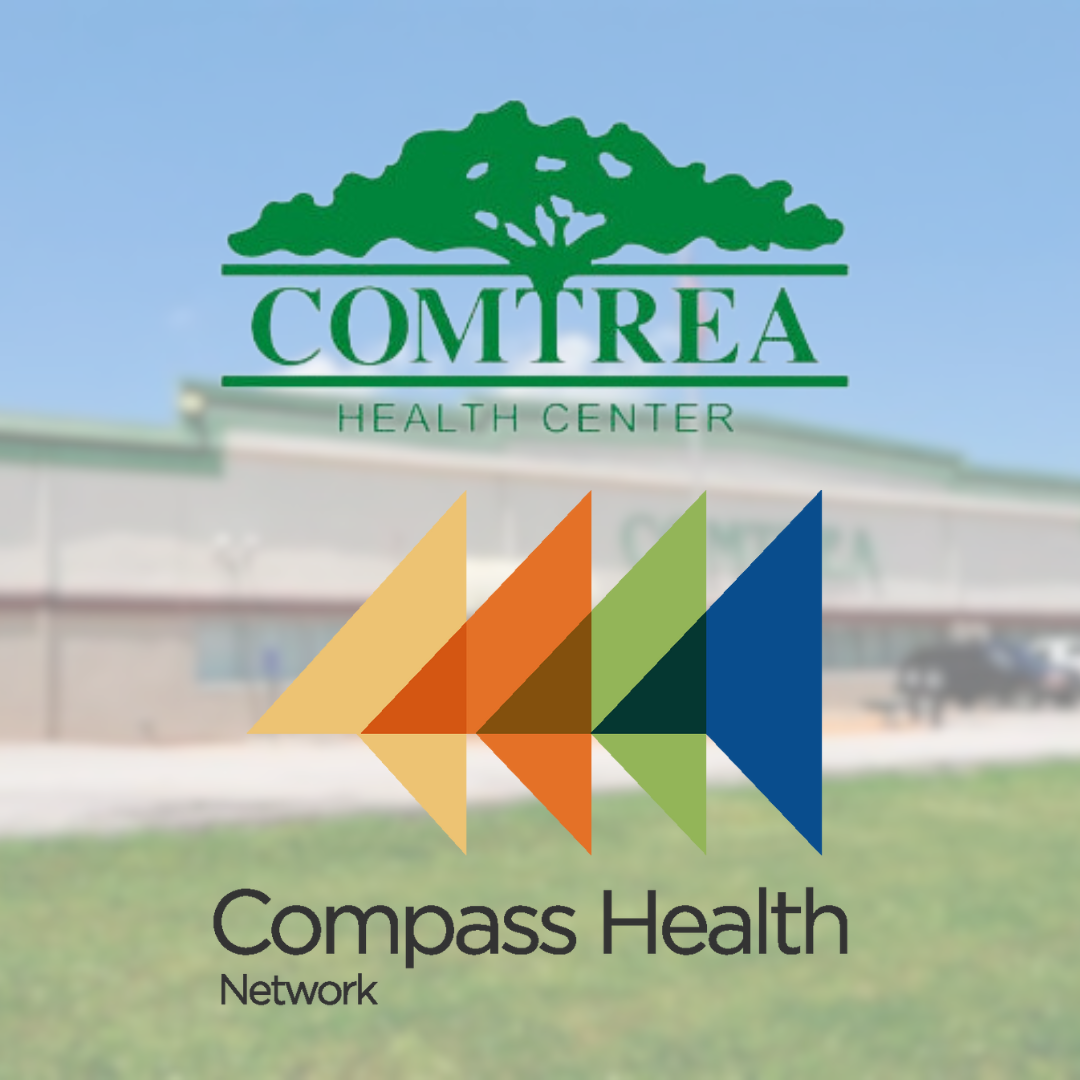
Comtrea to Merge with Compass Health Network
Comtrea to Merge with Compass Health Network
Jefferson City, MO; May 17, 2023, 2:00 pm
Effective July 1, 2023, Community Treatment Incorporated (Comtrea) will merge with Compass Health Inc. (Compass Health Network). After integrating under the unified banner of Compass Health Network, the agencies plan to serve an estimated 120,000 people annually, with a combined workforce of over 4,200.
Comtrea was established in 1973, to support a halfway house and has evolved into a Community Mental Health Center/Federally Qualified Health Center providing primary care, dental services, mental health, domestic violence services, children’s advocacy centers, and substance use treatment. In reference to the upcoming merger, Sue Curfman, President and CEO of Comtrea, “The need for more comprehensive health care and greater access to mental health services, substance use treatment, dental services, and primary care has never been greater. This merger delivers on this need with the expansion of current and new services, investments in our county, and an expanded workforce. We share the same mission, values, and commitment to delivering care with compassion, dignity, and respect. We truly are stronger together.”
Compass Health Network is a large integrated provider of behavioral health, primary care, and dental services. In addition to being a Certified Community Behavioral Health Organization and Community Mental Health Center, Compass is a Federally Qualified Health Center. This past year, Compass became one of Missouri’s 988 crisis call centers and now operates four behavioral health crisis centers and Royal Oaks Psychiatric Hospital. “This merger will bring additional services to Jefferson County and improve access to care. Within the next year, additional locations for consumers to receive services will be launched. Compass’ efforts as a center of excellence in integrated healthcare will be expanded with the addition of the Comtrea team.” said Tim Swinfard, CEO of Compass.
Plans are in place to assure a smooth transition for both Comtrea staff and patients. Officials from both organizations want to reassure all those served by Comtrea that they will continue to receive the excellent care to which they are accustomed during and after the merger process.
Visit Compass Health Network’s website at www.compasshealthnetwork.org for information about current services, service locations, and providers.
Contact Person: Katrina McDonald
Company: Compass Health Network
Address: 111 Mexico Court, St. Peters, MO 63376
Phone: 636.332.8353
Email: kmcdonald@compasshn.org

How Social Media Affects Mental Health
How Social Media Affects Mental Health
Globally, 59% of humans spend about 2 hours on social media every day.
Like it or not, social media continues to have a real-world impact on so many aspects of life. What’s more, social media habits can alter a person’s mental and physical health.
On one hand, social media can help isolated individuals feel less lonely. On the other, it can cause a person to feel insecure, anxious, or stressed. Have you ever felt this way after browsing online?
Exposure to so much content has its pros and cons.
Learn more about how social media could be impacting your mental health below.
The Effects of Social Media on Mental Health
Social media use has serious consequences on adult and youth mental health.
For some, social media provides an outlet for expression and social connection. For others, it becomes a breeding ground for bullying, negative content, and fear.
The way social media impacts you depends on the content you’re consuming. With that in mind, your behavioral health is linked to your online actions.
You can check to see the effect social media has on you by becoming more mindful. Take note of your emotions as you scroll, see certain content, or read through comments.
The Social Media Impact of Engagement Algorithms
Have you noticed that you’re feeling more negative after using social media? If so, then it might be more than a coincidence.
Facebook’s algorithms value your negative reactions way more than your normal likes. In fact, your feeds consider angry reactions 5 times as valuable as normal likes!
If you respond angrily to a post, then you’re likely to see 5 times as much of that type of content in the future.
You can combat this by refusing to use angry reactions. Don’t give negative content any of your attention at all.
This very important social media hack can solve most negative social media problems.
Possible Social Media Dangers You Need to Know About
Social media can cause and contribute to mental health conditions like:
- Anxiety
- Depression
- Body image issues
- Cyberbullying
- Insomnia
- FOMO
- Validation seeking
What’s more, social media can also become addictive. If you frequently use social media, then it’s best to attempt to fill your feed with positive posts.
You should also make sure not to spend too much time online. Like all things, balance is key. You can minimize the negative consequences of social media by balancing it with in-person socialization or other hobbies.
The Link Between Social Media and Mental Health Issues
Regardless of how you view social media, it’s obvious that it’s here to stay. To ensure you use it wisely, you’ll want to keep what you’ve learned in this article in mind. The link between social media and mental health issues is clear.
Too much social media can be either disastrous or empowering depending on how you use it.
If you know someone who struggles with mental health issues, then take the first step today. You can contact us to learn more about how our services might be able to help.

How Do I Find a VA Primary Care Provider
How Do I Find a VA Primary Care Provider
Far too many Americans are putting off their overall health care. Did you know that more than 100 million Americans do not have a primary care provider (PCP)? This means that they are less likely to follow up with specialists, stay current with vaccinations, and focus on a healthy lifestyle.
For America’s veterans, primary care is too important to ignore. They face shorter life expectancies than the average person. For example, female veterans have a life expectancy of just 63 years old.
Read on to learn how to find a family doctor in Missouri. Explore topics such as tips for finding a doctor and how to use VA benefits.
What Is the Mission Act?
Many veterans are under the impression that they need to receive medical care at a Veterans Affairs (VA) facility. While this was true for decades, the passing of the Mission Act in 2018 changed everything.
Veterans can now seek approval to see non-VA doctors. There are a number of eligibility criteria that veterans need to meet before receiving approval.
For example, veterans can seek outside care if their VA facility does not provide a particular service. For female veterans, two examples are maternity care and IVF.
There are also provisions for driving distance and waiting time. If a veteran needs to wait more than 20 days for a visit with VA providers, they can seek outside care. Also, veterans do not need to drive for more than 30 minutes for an appointment.
How to Find Private Doctors for Veterans
Once you receive approval to receive care outside the VA system, it is time to find a doctor. Selecting the right doctor is crucial for your health.
There are common attributes to look for when searching for a doctor. Continue reading for a brief description of each characteristic.
Positive Reputation
A consistent reputation for delivering quality care is critical. Word of mouth is one way to see if a provider has a positive reputation.
The internet is also a powerful tool for validating a friend or family member’s referral. You can read patient reviews on Google or social media. Here, you can learn from other patients’ experiences and avoid facilities with too many poor reviews.
Health Insurance
As a veteran, you do not have private health insurance. Instead, your care falls to the Department of Veterans Affairs.
You cannot just show up at any doctor’s office and expect to receive care. Instead, you need to verify that the healthcare organization takes payment from the VA.
Proper Services
Lastly, you need to verify that the doctors provide the services you are looking for. It is important to set medical goals that you are looking to achieve when seeing a primary doctor.
Some want to reduce their cholesterol while others need to monitor diabetes. Regardless of your medical goal, make sure that this medical provider offers what you need.
Your Guide to Finding a Primary Care Provider
You are now ready to find a PCP in Missouri. There are some important steps like verifying they have a positive reputation and offering the services you are looking for.
If you are looking for a primary care doctor in Missouri, contact us today to schedule an appointment.

Dental Anxiety: How to Overcome the Fear of Going to the Dentist
Dental Anxiety: How to Overcome the Fear of Going to the Dentist
Did you know that a huge number of Americans have never visited the dentist? When it comes to rural counties, about one in ten adults have never had a dental appointment.
According to the Missouri Coalition for Oral Health, a lack of education is one cause. Another common issue, though, is dental anxiety.
If you’ve been avoiding going to the dentist out of fear, then this guide can help. Read on to learn our top five tips for overcoming and rising above the fear you feel.
1. Identify Your Triggers
When it comes to dental care, there are many things that could trigger your anxiety. It could be the social anxiety of having someone looking into your mouth. It could also be the dental tools your dentist will use. Other common triggers include:- Fear of pain
- Anxious about the risks of dental sedation or other procedures
- Fear of needles
- Embarrassment
- Loss of control
2. Find a Dentist You Can Trust
Next, search for a dentist you feel comfortable with, you can trust, and that understands. You may need to try out a few different offices before you find one that feels right for you. It might be best to search for dentists who are prepared to handle anxious clients.3. Explain Your Dentist Phobia to Your Provider
Once you know what’s triggering your anxiety and you have a good dentist, talk about your fear. Your provider should be willing to work with you to find alternatives to avoid your triggers. If your trigger is unavoidable, then consider coping mechanisms. Since dental phobia is a valid diagnosis, you can also consider speaking to a therapist. They’ll be able to provide even better tips for you to use. If you dread the dentist, then consider asking for a therapist to speak to you during your appointment. They can help you work through your fear during your visit.4. Know You Are in Control of Your Dental Work
One thing that can be a huge help is to remember that you are in control of your dental work! Your dentist may recommend procedures, but you’re never obligated to follow through. Say no if you feel uncomfortable!5. Hold Yourself Accountable
Finally, hold yourself accountable. Don’t let fear rule your life and lead you to the reality of having bad teeth. Make sure you keep up with your appointments.Face Your Dental Anxiety and Improve Your Quality of Life
Dental anxiety is far more common than you think. You can’t let your fears cause you to miss out on crucial dental treatment, though.Consider using the steps above to help you tackle your dental phobias once and for all.
If you’re in Missouri and you’re hoping to overcome your fear of the dentist, then we hope we can help you. Our providers have experience working with anxious adults and children.
Fill out our online form and explain your situation. One of our providers will reach out to you as soon as possible to get started on your better health journey.

Why Are Sports and School Physicals Important Before School Starts?
Why Are Sports and School Physicals Important Before School Starts?
The fall sports season is around the corner and it is time to schedule your annual physical. Did you know that more than 57% of high school students participate in at least one sport?
This means that millions of students are set to play fall sports such as football and soccer. In the medical community, this results in a mad rush to get physicals in during late August.
Do not wait to get your fall sports physical scheduled. Read on to learn why school physicals are so important. Explore how physical exams and medical screenings can detect potential issues in young athletes.
What Is a Sports Physical?
Before diving into its value, it is important to understand what back-to-school physicals are. Here, a medical doctor takes a comprehensive look at a student’s physical and mental health.
Medical professionals start the process by reviewing the student’s history. This includes any existing issues or disclosures of family medical history.
For example, the student may disclose that there is a history of heart disease in their family. As a result, the doctor may refer the student to a cardiologist for an EKG and other heart-related testing.
Once the visit starts, the doctor performs a physical health screening. They are going to carefully inspect the student’s muscles, joints, and bones.
The doctor also checks the child’s lungs and vision. Blood pressure, heartbeat, and pulse are two other important items to monitor.
Many doctors are also adding a mental health screening to the child’s physical. Today, students are under a lot of pressure to perform academically and athletically. For many, it takes an enormous toll and mental health issues emerge due to these pressures.
According to a U.S. Center for Disease Control (CDC) study, roughly 1 in 5 students have a mental health disorder. This figure has increased due to modern challenges like cyberbullying and the Covid-19 pandemic.
A mental health screening can identify feelings of depression and anxiety. Now, the child can receive the help that they need.
What Are the Risks of Delaying a Sports Physical?
Many people wait until the last minute to schedule their sports physicals. This is a mistake for many different reasons.
For starters, your child cannot participate in school sports without a proper physical. If the medical office cannot get you in promptly, your child may miss the start of their season.
Also, sports physicals are an important tool in preventative medicine. In many cases, the doctor identifies a potential medical issue before it becomes a larger problem. Identifying a health issue early allows your child to correct the root cause and get better.
Your Guide to School Physicals
You are now ready to promptly schedule your Missouri sports physical with Compass Health Network. The fall season will be here before you know it.
Make sure to get on the doctor’s calendar before appointments are booked through September. Not only is it a prerequisite for playing school sports, but also an important medical tool for preventative care.
If you are looking to schedule a school physical, contact us today to get on the calendar.

Celebrate Healthcare Workers During National Health Center Week 2023!
Celebrate Healthcare Workers During National Health Center Week 2023!
Despite our best efforts, there is no way to adequately express our gratitude to healthcare centers and workers. There are 22 million Americans working in the healthcare industry. That makes up 14% of the United States workforce.
They are all directly responsible for saving lives. During the Covid-19 pandemic, these workers put their own lives at risk to help others.
Without health centers, our medical heroes do not have a place to perform these miracles. Read on to learn all about National Health Center Week in 2023. Explore topics such as the background of National Health Center Week and how scheduling a health checkup honors the workforce.
What Is National Health Center Week?
National Health Center Week takes place every August. It is sponsored by the National Association of Community Health Centers (NACHC).
The objective of the week is to celebrate the accomplishments of community health centers. The organizers also seek to raise awareness of the 1,400 community health centers operating in the United States.
Delivering exceptional patient care is a total team effort. While doctors and nurses are a critical part of patient care, it is important to recognize the many other contributors. Everyone from board members to janitorial staff deserves to be celebrated.
What Is a Community Health Center?
Many people do not understand the purpose of a community health center. There are millions of Americans without health insurance. Many more have health insurance but struggle with affordability.
Besides cost and health insurance, there are other barriers that prevent people from receiving quality healthcare. Distance and language are two other common issues for patients.
Community health centers were launched in 1965 to break down these barriers. The idea was to build a health center within the community to serve all their medical needs.
Since then, more than 1,400 community health centers have been built across the United States. Many of these centers fall under the Compass Health Network in Missouri.
What Can You Do to Support Healthcare Workers?
Celebrating healthcare workers for one week is not enough. The best thing that you can do is help make their job easier.
Healthcare workers do not enjoy seeing their patients struggle with serious ailments. It is an incredible mental burden to see patients in pain or lose their lives. Instead, they would prefer to see you receive preventative care and proactively treat health issues before they escalate.
You can do this by scheduling a checkup at a community health center. Here, the medical staff will perform a comprehensive patient examination. They will review blood work and spot any potential issues that require further examination.
Donations are also welcome at community health centers. Your donations are invaluable for providing medical workers with the supplies they need on a daily basis.
Your Guide to National Health Center Week 2023
You now understand the importance of community health centers and the workers that keep them running. Go ahead and thank a medical worker today for all their hard work. These heroes deserve all the recognition as they uphold the community’s quality of life.
If you want to take action for National Health Center Week in 2023, contact us today to schedule your health checkup.

Going Back to School: Tips for Overcoming Anxiety and Bullying
Going Back to School: Tips for Overcoming Anxiety and Bullying
Do you have an anxious student on your hands? If so, then you’re far from alone. About 1 in 3 students will experience an anxiety disorder before they reach 18.
What’s more, data for that statistic was all compiled before 2020.
Since that time, the world has only become more stressful and anxiety-ridden. So, it’s likely that statistic has only gone up.
The good news is overcoming anxiety and bullying in school is not only possible but within reach. By taking a few steps before school starts, you can lay a healthy foundation for your student to thrive.
Keep reading to learn our top five tips on how to deal with elementary school bullies.
1. Focus on Communication With Your Child
One of the biggest reasons you may have an anxious student on your hands is because of a lack of communication. Some children don’t feel safe enough to express what’s happening to them.
Since they likely don’t have the coping skills needed to deal, they may suffer silently.
For that reason, you must focus on communicating with your child. You can’t help your child through something you don’t know is happening.
2. Normalize Student Anxiety
One thing that can help foster communication is normalizing student anxiety. In the past, society tended to downplay behavioral health issues like anxiety.
You can be the change you want to see by normalizing these issues for the next generation. Explain how every student will get anxious at some point. Then, explain the difference between productive and negative anxiety.
3. Talk About How to Handle Elementary School Bullies By Identifying Them First
Another thing you need to normalize is bullying. Explain to your child that bullies have always existed, and they always will exist. Bullying does not stop once kids reach adulthood.
That’s why you need to help your child identify and recognize bullying first. From there, you can start to discuss how to handle these situations when they come up.
4. Research and Discuss Coping Mechanisms
You should instruct your child to stay as far away from the bully as possible. Teach your child how to assert healthy boundaries and stand up for themselves.
Tell them who to report to if the other child continues to be disruptive.
5. Schools on Bullying: What Policies Are in Place?
Depending on the situation, you may need to consult with the school about what’s happening.
Learn what policies are in place, and verify they are being upheld. Take the necessary steps to escalate the situation to protect your child. Research your options if the school isn’t cooperating.
Overcoming Anxiety and Bullying in School
If you have a child going to school soon, then you must consider anxiety and bullying. These factors are present at all ages in school, and your child will get exposed if they’re in public school.
The good news is that overcoming anxiety and bullying in school is possible with these tips.
Keep communication open, normalize anxiety, and talk with your student. Discuss coping mechanisms, and consider talking to the school if things progress.
As a parent, you know that protecting your child is paramount. If you’re worried about their mental health, then we can help. Contact us to learn more about our services.

Back to School – Get Your 6 Month Dental Check Up Done Before School Starts
Back to School – Get Your 6 Month Dental Check Up Done Before School Starts
Did you know that only 50% of children on Medicaid have yearly dental appointments?
As the summer comes to an end, parents and children are gearing up for another exciting school year. Fresh notebooks, new backpacks, and trendy outfits all make the checklist. However, dental health is often overlooked.
To ensure your child’s teeth are healthy during the school year, ensure you schedule a dental check up. Below is a guide that delves into why you should opt for a dental checkup before the new school year.
Ensures Proper Teeth Development and Oral Health
Children’s teeth are constantly evolving. As a parent, you need to ensure the teeth are coming in correctly and without any complications.
Dental check ups are vital for monitoring the growth and development of your kid’s teeth. It can help you detect issues like misalignment or overcrowding early. This can lead to timely orthodontic interventions.
Prevents Absences and Poor Academic Performance
It’s estimated that millions of school hours are lost each year because of dental issues. If your child experiences dental pain, they may also find it difficult to concentrate on their studies. This can lead to decreased academic performance.
Routine dental visits can prevent unnecessary absences. Good dental care can also help your child focus on their education.
Allows for Preventive Care
Tooth decay is one of the most common childhood dental issues. The combination of vending machine snacks and school lunches can significantly contribute to the risk of cavities.
A dental check up can identify any signs of tooth decay. The dentist can perform a thorough cleaning to reduce decay. Additionally, they will offer valuable tips on proper oral care and dietary choices for your child.
Boosts Your Child’s Confidence
Dental issues can affect your child’s self-esteem. They may not be able to smile or talk with confidence. A 6-month dental checkup can help your child achieve a healthy and attractive smile. When they start the new school year with a clean and beautiful smile, they will feel more self-assured.
Improves Overall Health
Dental health is intricately linked to general well-being. Neglecting your kid’s dental problems can have significant consequences.
If your child has untreated dental issues, they may experience pain and discomfort. This can hinder their ability to eat properly and get the necessary nutrients. As a result, it can compromise their overall physical and mental well-being.
Prioritizing dental check ups can ensure that any dental problems are quickly addressed. It can prevent them from escalating into more serious health concerns.
Balances Busy Schedules and Dental Care
As the school year progresses, the schedule becomes busier with academic commitments and extracurricular activities. It can cause dental care to become less of a priority.
This is why getting a dental check up before the school year starts is important. It can set a strong foundation for maintaining regular dental visits throughout the year. As a result, you can instill good oral habits in your child.
Schedule a Dental Check Up for Your Kid Today
A routine dental check up before school starts can make a world of difference in your child’s well-being. It ensures their teeth are strong and healthy. Need to book a dental check up for your child?
Look no further than Compass Health Network. We provide comprehensive dental care for children. Contact us today to book an appointment.

Understanding Suicide Prevention Month: #BeThe1To Make a Difference
Understanding Suicide Prevention Month: #BeThe1To Make a Difference
You Are Not Alone:
In moments of darkness, it’s crucial to remember that you are not alone. The struggles you face might feel isolating, but there is a network of support waiting to guide you towards light. Whether you’re battling personal challenges or concerned about a loved one, reaching out is the first step towards healing.#BeThe1To Make a Difference:
The #BeThe1To campaign encapsulates the essence of Suicide Prevention Month. It’s a call to action, urging each one of us to be that one person who can make a difference in someone’s life. A simple conversation, a caring gesture, or a supportive presence can offer the lifeline someone desperately needs. By taking the initiative, we become agents of hope and change.Getting Help:
If you or someone you know requires immediate mental health support, don’t hesitate to call 988. This three-digit number is dedicated to providing assistance during crisis situations. It’s a number that connects you to professionals who understand, listen, and offer guidance when you need it the most.Compass Health Network:
At Compass Health Network, we’re committed to promoting mental well-being and providing accessible care. If you’re seeking a mental health appointment, reach out to us at 844-853-8937. Our compassionate team is here to assist you on your journey to healing.Visit CompassHealthNetwork.org:
Conclusion:
During Suicide Prevention Month, let us come together as a community to #BeThe1To make a positive impact. Remember, there’s strength in unity, and even the smallest gestures can have a profound effect on someone’s life. Whether it’s lending an empathetic ear or seeking help for yourself, know that you have the power to make a difference. You are not alone – help and hope are just a call away.
Phelps Health and Compass Health Network Announce Partnership and Transition of Services
Phelps Health and Compass Health Network Announce Partnership and Transition of Services
FOR IMMEDIATE RELEASE
Contact: Deborah R. Frost, Ph.D., Compass Health Network VP of Corporate Services
Phelps Health and Compass Health Network Announce Partnership and Transition of Services
[Rolla, MO] – Phelps Health and Compass Health Network announced a partnership to improve behavioral healthcare in the region today. Under the terms of the agreement, Compass Health Network will assume the operation for Phelps Health behavioral outpatient services and support the psychiatric professional services of the inpatient behavioral health program beginning December 1, 2023.
Compass Health will lease and renovate space on the third floor of the Phelps Health Delbert Day Cancer Institute for a behavioral health outpatient clinic and autism diagnostic center.
“We are excited to work with Phelps Health to improve the health and well-being of our community,” said Tim Swinfard, CEO of Compass Health Network. “This is a great opportunity to expand our behavioral health services and provide our patients with even more comprehensive care.”
The collaboration is mutually beneficial. “Our organizations have different strengths that can be combined to ensure our patients receive the care they need when they need it,” said Jason Shenefield, CEO of Phelps Health. “Compass Health will continue to provide our patients exceptional behavioral healthcare, and we can focus on our other core service areas.”
The transition is expected to be seamless without disrupting patient treatment, care, or service locations. All existing team of Phelps Health behavioral health physicians, providers, and staff will transition to Compass Health employees if they wish, so our patients will continue to be able to see the healthcare professionals they know and trust.
“Patients will be notified of this transition well before the change-over date on December 1, and staff will be available in the months leading up to the transition to answer any patient questions or concerns about their care,” Shenefield said. “Compass Health will operate the behavioral health outpatient facilities previously provided by Phelps Health, so patients can continue to see their providers in a familiar location.”
Both Shenefield and Swinfard are excited about the potential the collaboration creates to improve patients’ health in the community. “Working together, we can make a significant difference in the lives of those we serve,” said Shenefield.
Please direct questions to Deborah R. Frost, Ph.D., VP of Corporate Services at dfrost@compasshn.org or (573) 578-2962.
About Phelps Health
Phelps Health serves over 200,000 residents in south-central Missouri. Phelps Health is county-owned, non-tax supported, and overseen by a five-member elected board. Phelps Health employs more than 1,900 people, including 100-plus providers. Phelps Health, which includes a hospital licensed for 240 patient beds, serves a six-county area, with its main campus and several clinics in Rolla, Missouri. Phelps Health also has clinics in Salem, St. James, Vienna, and Waynesville, Missouri. For more information, visit phelpshealth.org.
About Compass Health Network
Compass Health Network is a leading healthcare provider in Missouri that offers a comprehensive range of health services, including primary care, behavioral health, and dental health services. With a focus on quality, affordability, and accessibility, Compass Health is dedicated to improving the health and well-being of the community. For more information, please visit compasshealthnetwork.org.

Taking Care of Yourself During Suicide Prevention Awareness Month
Taking Care of Yourself During Suicide Prevention Awareness Month
Like many states in America, Missouri’s suicide rate is reaching alarming levels. The death rate is approaching 19 people for every 100,000 in the state.
There are many reasons why a person chooses to take their own life. Mental health, life-changing events, poverty, and drugs are just a few of the potential causes.
The good news is that we can all play a vital role in preventing suicide and saving lives. This is the purpose behind Suicide Prevention Awareness Month.
Read on to learn how to deal with suicidal thoughts, explore difficult topics such as suicidal ideation, and identify depressive symptoms.
What Is Suicidal Ideation?
This is a term used to broadly describe a person having suicidal thoughts. Some individuals develop a preoccupation with death and suicide. They openly or discretely wish for their own death.
Taking these thoughts seriously is a prerequisite for any suicide prevention strategy. Ignoring suicidal clues is a recipe for regret and tragedy. Instead, it is best to err on the side of caution and seek help when you discover indications of suicidal ideation.
Seeking help is not always as easy as it sounds. In some cases, there are no obvious signs that a person is struggling with depression or life purpose.
Is Mental Health Important?
Mental wellness and self-care are critical tenets for suicide prevention strategies. As a parent or loved one, it is essential that you learn about depression symptoms.
Depression presents itself in different ways depending on the person. For some people, there is a noticeable change in behavior. They are always sad, lack energy, and seem disinterested in their family and friends.
Others exhibit extreme highs and lows. They are happy and energetic one day. The next day, they are bedridden and do not want to move.
This may be a sign of bipolar disorder, which can be a root cause of depression. Anxiety is another root cause of depression. Like bipolar disorder, both of these mental health conditions can be treated.
There are also outward expressions of negativity linked to depression. A depressed person may come off as irritable, pessimistic, and frustrated.
What Are Some Suicide Prevention Tips?
The old adage of “see something, say something” is true for suicide prevention. Missouri citizens have access to a suicide and crisis lifeline, 988. This will quickly put you in touch with experts on the subject.
They will respond quickly to your situation and deploy first responders if necessary. Also, suicide and crisis hotlines refer you to medical networks that can help as needed. In Missouri, you can receive treatment at any Compass Health Network location.
Compass has specialists in behavioral health and substance use disorder. They can help diagnose depression and other root causes that may lead to suicidal ideation.
Your Guide to Suicide Prevention Awareness Month
September is Suicide Prevention Awareness Month, and you are ready to do your part. Spotting the signs of depression and other mental health disorders is the first step. The next challenge is enlisting the help of medical professionals.
If you want to learn more about suicide prevention, contact us today to speak with a medical expert.

The Importance of Sports Safety and Preventing Injuries for Young Athletes
The Importance of Sports Safety and Preventing Injuries for Young Athletes
The benefits of youth sports are undeniable. A child that’s involved in playing sports is 92% less likely to do drugs and 80% less likely to get pregnant. They’re also 3 times more likely to graduate than non-athletes.
These advantages don’t discount the risks young athletes experience, though. Because sports are physical, the risk of injury is always there.
That’s one reason why injury prevention is key. It’s crucial that both adults and kids know the risks and rewards associated with sports. That way, they can make an informed choice on playing.
Below, we’ll go over basic sports injury prevention tips and how to cope with an injury if it does happen.
General Sports Safety Tips to Know
Sports safety for kids starts with coaching. The right coach is aware of potential risks and is honest about them right away.
Always ask your child’s coach about general safety tips specific to your child’s sport.
Recent reports show that sports injuries are on the rise. UCLA Health found an interesting connection that explains this trend — sports specialization.
There is a link between training volume, intensity, and injury risk. In recent years, more parents have pushed children towards intense, single-sport training. This can lead to repetitive micro-trauma and injury.
To combat this, make sure your child gets rest periods.
Injury Prevention Starts With Awareness and Vigilance
Once you’re aware of the risks of the sport your child wants to play, learn the right way to handle them. Your child’s coach should focus on first explaining the proper technique. This factor will prevent a huge amount of injuries.
Next, your coach should explain the proper conditioning that should take place. Conditioning prepares your child’s body for the sport and protects them from injury.
Finally, the coach should focus on ensuring any equipment is safe, too.
These three factors are the main culprits behind most injuries. If you and your child stay aware of them, then an injury is much less likely.
Coping With Sports Injuries
If your child gets injured, consider seeing a pediatric and family medicine specialist. The sooner you see a doctor, the better for your child.
Listen to your child’s doctor about how to cope with the injury. It’s likely they will need to take time off from their sport of choice. They may even miss some school depending on the extent of the injury.
Risk Versus Reward: Keeping Young Athletes Safe
Child safety when it comes to young athletes is a balancing act. Sports are inherently risky, so you’ll need to do your best to stay aware and vigilant.
Know the signs of injury to watch for, and know what to do if your child does experience a common sports injury.
One important aspect of keeping your child safe is maintaining regular pediatric care. If you don’t already have a regular doctor, then it might be good to establish care when your child joins a sport.
Contact Compass Health Network now to learn more about our services and how we can help.

Tooth Fairies Around the World: Learning About Different Traditions
Tooth Fairies Around the World: Learning About Different Traditions
As the Tooth Fairy tradition remains strong across the US, the Tooth Fairy allegedly visited 79% of homes with children ages 6-12 who lost teeth. The tradition is a way for parents to make the process of losing baby teeth more magical and exciting for children. It can also help to teach children about the importance of oral health.
Different cultures have their own versions of tooth fairies. They can be a fairy, mouse, goblin, or a combination of different fairies. In this article, we explore some of the different tooth fairies around the world.
The Origins of the Tooth Fairy Tradition
There’s a lot of mystery surrounding Tooth Fairy traditions. One theory is that the Tooth Fairy tradition originated in Europe and evolved into the modern Tooth Fairy legend. This European Tooth Fairy left a gift under a child’s pillow in exchange for their lost tooth.
Another theory is that the Tooth Fairy tradition comes from the ancient practice of tooth-collecting. In some cultures, people believed children’s teeth had magical properties, so they collected these teeth and used them in amulets or charms. The Tooth Fairy tradition may symbolize a way to explain the disappearance of these teeth.
Tooth Fairies From Around the World Explored
In Spain, the Tooth Fairy is a mouse named Ratoncito Perez, often depicted as a tiny, furry mouse with a red cap. France and French-speaking countries have a fairy known as Le Petite Souris. In Germany, the Tooth Fairy is a mouse named Zahnfee, often depicted as a tiny, white mouse with a blue dress.
In Italy, the Tooth Fairy is Fatina dei denti, a small, blonde fairy with a pink dress. Some Asian cultures equate the tooth fairy to throwing teeth on the roof for it to grow stronger. In Brazil, the Tooth Fairy is a bird named Papai do Dente, depicted as a small, yellow bird with a red beak.
.
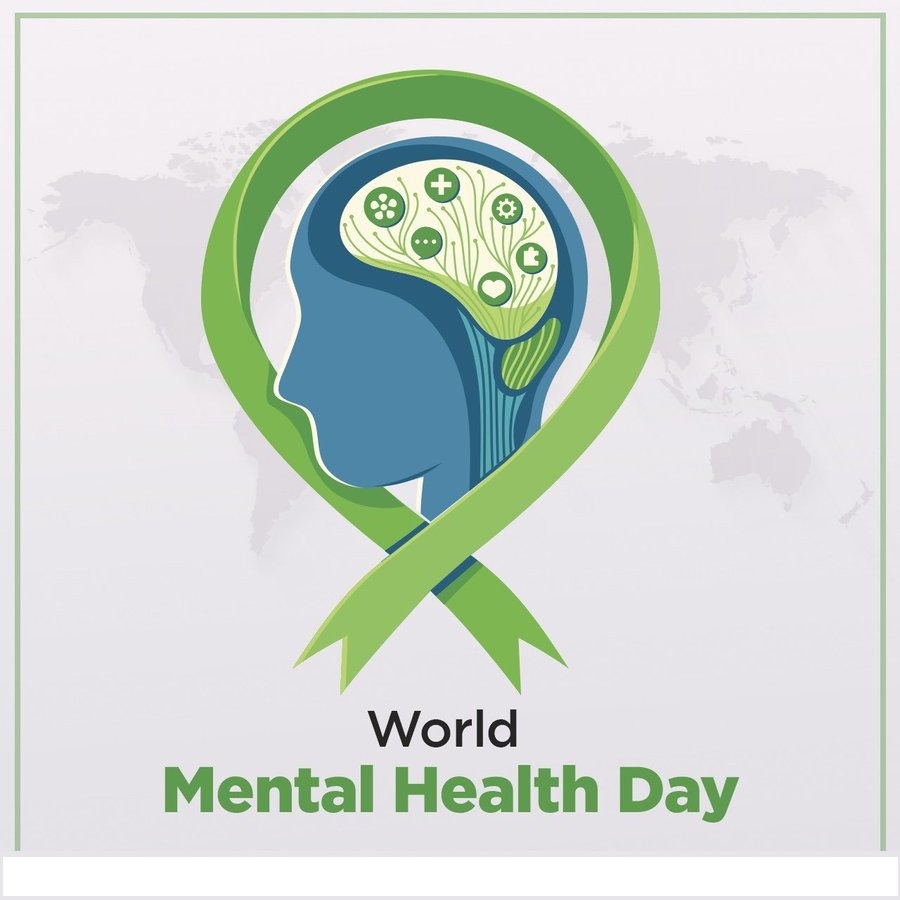
World Mental Health Day
World Mental Health Day
It’s estimated that 23% of Missouri adult residents experienced a mental illness in 2020. That makes the likelihood of someone you know silently suffering pretty high!
Mental health needs to become a bigger priority for us all in 2023. Thankfully, October 10th is the perfect day to start to change our mindset.
October 10 is World Mental Health Day!
We hope you will take the time to celebrate this important day by learning more about mental health and mental wellness. If you can identify the signs and symptoms of mental health issues, you will be better positioned to act.
From there, you can help spread awareness about the importance of mental health.
Read on to learn more and empower yourself to make a difference.
World Mental Health Day: Spreading Awareness
We cannot properly celebrate World Mental Health Day until we know more about what mental health means. Mental health is described as our overall mental state. It includes our psychological, emotional, and social well-being.
Our mental health can determine how we handle stress. It can change how we act, think, and feel. It can also determine our emotional limits and boundaries.
There are many conditions, disorders, and diseases that can alter mental health. Take Covid-19, for instance. This virus can alter someone’s mental health by inducing insomnia, anxiety, and even depression into their life. (In many cases, it has affected them significantly.)
Here are a few common mental health problems:
- Depression
- Anxiety
- Obsessive Compulsive
- Disorder
- Panic disorder
- Post-Traumatic Stress Disorder
- Social anxiety disorder
- Bipolar affective disorder
- Schizophrenia
The more you know about these conditions, the better equipped you will be to spot them.
How to Spot Signs of Mental Health Problems
Since mental health takes into account many factors and the symptoms present in different ways, we can define it as a “spectrum.” That is why it is paramount to identify the symptoms of worsening mental health. Here are some things to watch for:
- Experiencing physical symptoms of anxiety (stomach issues, chest tightness, headaches)
- Feeling overly stressed and anxious to the point it prevents you from daily activities.
- Emotional outbursts
- Weight or appetite problems
- Withdrawing from family, friends, and favorite activities
- Abusing substances
- Experiencing suicidal thoughts
- Engaging in high-risk behavior
- Performing worse at work or school
Finding the right treatment is the pathway forward to better health.
How to Help Someone With Mental Health Issues
If you spot signs that their mental health is getting worse, then act on it immediately.
Encourage your loved one to open up about how they are feeling. Depending on the situation, you might also recommend professional help. A visit with a behavioral health expert could help your loved one change their life.
Celebrate World Mental Health Day on October 10
Understanding the impacts of mental health starts with getting informed. We need to be able to identify symptoms and issues. That way, we can help everyone cope by suggesting treatments for mental health issues.
On October 10 and beyond, keep this newfound information in mind.
Now that you know more, it’s time to act. If you are in Missouri or know someone in need, consider consulting with our health network. We can be reached by phone 844-853-8937 or walk in to start an assessment at a Compass Health Network location near you.
If you are in crisis, then call 988 to contact the Missouri lifeline suicide and crisis hotline now.

The Warning Signs of Domestic Abuse That You Should Never Ignore
The Warning Signs of Domestic Abuse That You Should Never Ignore
Domestic violence is far too common in Missouri. In fact, Missouri has the third-most abuse reports in the United States. In a single year, the state sees more than 45,500 reports of abuse.
October is domestic abuse awareness month. Awareness month is a great opportunity to increase your knowledge of the signs of domestic abuse, so you can be an advocate for individuals who are involved with an abusive partner.
Read on to learn how to stop domestic abuse. Explore topics such as what to do if you suspect domestic abuse.
What Are the Different Types of Abuse?
To be an advocate for others, it’s important to understand the many different types of abuse. Physical abuse is the easiest type to spot.
This is because abusers often leave their mark on a victim. They may leave bruises and cuts on a victim’s body. It is not uncommon to see the abused walking gingerly after abuse.
Many victims try to cover it up to protect their abusers. They may wear a long-sleeve shirt to conceal bruises or put on makeup to hide blemishes on their face.
Some abusers do not lay a hand on their victims. Instead, they use psychological or mental abuse as their weapon of choice. These types of abuse are much harder to identify. Even harder to recognize are the signs of financial, religious or sexual abuse. It is not uncommon for a victim to suffer multiple forms of abuse throughout the duration of their relationship, and even after the relationship has ended.
What Are the Signs of Domestic Abuse?
Many people feel uneasy asking an abuse victim about their cuts and bruises. The best tactic is to casually ask your friend or loved one how they got that bruise, scratch, limp, etc. and pay close attention to their reaction.
Also, look for unexplainable clothing choices. Is the victim wearing a hooded sweatshirt on a warm summer day?
There are professional tips for identifying mental or psychological abuse. For example, you may see a change in personality or behavior from your loved one. They may suddenly become reserved or introverted.
In some cases, your loved one may become distant. They may not have the desire to be social, or their abuser may disallow them to leave the home. This can lead to canceled plans. Also, they may experience feelings of depression or anxiety.
Many victims turn to drugs or alcohol in the wake of abuse or are forced to begin using a substance by their abuser. Observing a new or increased consumption of a substance may indicate that something is wrong.
What to Do if You Suspect Abuse?
Once you have confident suspicions of abuse, it is time to help your loved one. If you see something, it is important to say something.
It’s best if the victim seeks help on their own. You should encourage a loved one to seek help but understand they may not want to compromise the abuser. Leaving an abusive relationship is often the most dangerous time for a victim.
There are abuse hotlines that provide resources and guidance for victims and their families. This is the most anonymous and discrete way to handle abuse.
Your Guide to Spotting and Reporting Abuse
You now have a basic understanding of spotting and reporting abuse.
To help, start off with a conversation with the victim. Without prying or pushing, try to persuade them to seek help.
If you are a victim of domestic abuse and need medical attention please call our shelter services with resources at 636-232-2301 or contact us at Compass Health Network to receive professional help.
You now have a basic understanding of spotting an abusive relationship. The most important thing you can do if you know someone is living with abuse is to offer support without pressure. Assure the victim that you are there to listen and refrain from telling them what they “should, or must” do.
Have a list of resources to provide the victim and give them a safe place to use a telephone to contact services. Advocates at A Safe Place are available 24/7 every day of the year to speak with victims. Advocates can provide connection to resources, safety planning, crisis services, emergency shelter and more. Friends and family of victims are also invited to call the shelter for resources, education and support.
You may offer to store a go bag for the victim if they flee in a hurry. You can help the victim gather important documents such as photo id’s, birth certificates and social security cards and a change of clothes or some spare cash to put in the go bag.
On average a victim will attempt to leave an abuser seven times before they are successful. Through this process they often lose their support network as family and friends grow tired of seeing them return to their abuser. The best thing to do for a victim is have resources ready when they are needed and to remain a constant supportive person who will not judge or lecture the victim’s choices.
If you are a victim of domestic abuse and need medical attention, contact us at Compass Health Network to receive professional help or call our shelter services at 636-232-2301.

October is National Dental Hygiene Month
October is National Dental Hygiene Month
By age 8, over half of children (52%) have experienced cavities in their primary teeth, and shockingly, 1 in 4 adults aged 20 to 64 currently battles with cavities.
As we welcome October, it’s more than just a celebration of autumn leaves and pumpkin spice; it’s a time to prioritize our oral health.
Why you ask? Because October is National Dental Hygiene Month!
Many might be aware of the dental challenges children face, but how often do we consider adult dental health? If you’ve ever wondered why dental hygiene is so essential for adults, this month, and especially this brief guide, holds the answers. Read on to discover the importance of a healthy smile, no matter your age.
Why Is Dental Hygiene Important for Adults?
Many adults think that dental hygiene is only for children, but this isn’t true. Adults need to take care of their teeth and gums just as much as kids do, if not more. In fact, dental hygiene can help you avoid problems such as:
Tooth Decay
This occurs when plaque buildup on your teeth causes damage to the enamel. Bacteria in your mouth convert sugars and starches into acids that erode the enamel and cause cavities. Tooth decay can lead to cavities, pain, sensitivity, and even tooth loss.
Gum Disease
This is the inflammation and infection of the gums caused by plaque and tartar. It can cause bleeding, swelling, redness, and bad breath. If left untreated without a dental check-up, it can lead to periodontitis-a more severe form of gum disease that can damage the bone and tissue that support the teeth.
Oral Cancer
This is the abnormal growth of cells in the mouth or throat. It can affect the lips, tongue, cheeks, gums, or palate. It can cause sores, lumps, pain, difficulty swallowing, or changes in your voice. It can be life-threatening if not detected early.
Enjoy the Benefits of Dental Hygiene Practices
Practicing good dental hygiene can also be good for your general health. Learn more about the benefits below.
Reduce the Risk of Heart Disease and Stroke
Poor dental hygiene can allow bacteria to enter your bloodstream and cause inflammation and infection in your arteries and heart valves. This can increase your chances of having a heart attack or stroke.
Improve Your Blood Sugar Control
Poor dental hygiene practices can lead to infections and inflammation in your gums. This can negatively impact your body’s ability to process insulin and control blood sugar levels properly. People with diabetes are more prone to gum disease, which then raises blood sugar and increases your risk of developing diabetes.
Boost Your Self-Esteem and Confidence
Having stained, missing, or crooked teeth can make you self-conscious and reluctant to smile fully. Conversely, a healthy, attractive smile gives you confidence in social situations and business settings. It also works wonders for your mental health and self-image.
Celebrate National Dental Hygiene Month With Compass Health Network
October is National Dental Hygiene Month, and there’s no better time to take care of your oral health and smile. Whether you need a routine check-up, a filling, a crown, a denture, or a root canal, Compass Health Network’s Missouri dentists are ready to help you achieve your dental goals.
Reach out to Compass Health Network today for help finding a dentist in Missouri.

Nurse Practitioner Week
Nurse Practitioner Week
Nurse practitioner is one of the fastest-growing career fields in the United States. More than 266,000 Americans qualify to serve as a nurse practitioner.
By 2032, this number will increase by a staggering 45%. This growth rate is much higher than the national average.
It comes as no surprise to see the growth in nurse practitioners. This position is critical to the nation’s healthcare system. Without them, life expectancy would certainly decline, and Americans would be sicker.
This week is one to celebrate nurse practitioners and their positive role in health care. Read on to learn all about National Nurse Practitioner Week. Explore topics such as the theme for Nurse Practitioner Week and what the position entails.
What Do Nurse Practitioners Do?
Before diving into NP week, it is important to understand what nurse practitioners do. Nurse practitioners fill the nation’s growing doctor shortage. By 2033, medical experts believe there will be a shortage of up to 139,000 physicians.
Nurse practitioners do many of the same things as primary care doctors. They evaluate patients and diagnose ailments.
Nurse practitioners order and perform diagnostic tests. They evaluate the results of those tests and prescribe medicine or treatments accordingly.
Also, nurse practitioners create patient care plans and follow up regularly to check the progress. They also take and review patient’s medical history to identify potential health risks.
What Is NP Week?
NP Week intends to raise awareness for this critical position. Additionally, organizers seek to remove barriers that prevent nurse practitioners from doing their job to the fullest.
There is still a stigma in the medical industry that only doctors can perform the tasks listed above. However, this thought process is inaccurate and does not reflect a nurse practitioner’s education and training.
By celebrating nurse practitioners, positive attention is brought to the career field. Organizers can instill confidence in nurse practitioners’ capability in patients and medical providers.
What Is the Theme for NP Week?
The theme for NP week is “Recognizing Heroes in Health Care.” To help recognize nurse practitioners, organizers received 46 proclamations from state governors and local elected officials.
Nurse practitioners see more than 1 billion patients per year. They were instrumental during the COVID-19 pandemic as many medical offices and hospitals were overwhelmed with patients.
Nurse practitioners often work in urgent care and other family medicine centers. These facilities received thousands of COVID-19 patients in Missouri alone. Every day, nurse practitioners and other healthcare workers put their lives and long-term health on the line to visit with COVID-19 patients.
Your Guide to Celebrating Nurse Practitioner Week
You are now ready to do your part and spread the word about the incredible role that nurse practitioners play in the healthcare industry.
Compass Health Network relies on nurse practitioners to treat Missouri’s citizens. If you want to help celebrate National Nurse Practitioner Week, contact us today at Compass Health Network to see how you can get involved.
Children’s Advocacy Center
Children’s Advocacy Center
If you suspect child abuse, please call the Child Abuse Hotline at 1-800-392-3738 or contact your local law enforcement agency
Our mission is to facilitate a community-based collaborative effort to improve the system’s response to allegations of child abuse and neglect by following the ChildFirst Doctrine

CHILDREN FIRST
COMMUNITY COLLABORATION
SAFE INTERVIEWS
ADOVCACY
SERVICES
BENEFITS
- Restructure the interview process to meet the needs of the child
- Fewer interviews lead to less trauma to the child
- Collaborate between agencies involved in child abuse investigations
- Identify needed services for the child and family
- Provide mental health services for the child and family
- Provide coordination and collaboration of medical services
- Identify gaps in services and the investigation process
- Provide specialized training for staff and multidisciplinary teams
- Provide quality assurance through case review with all agencies involved
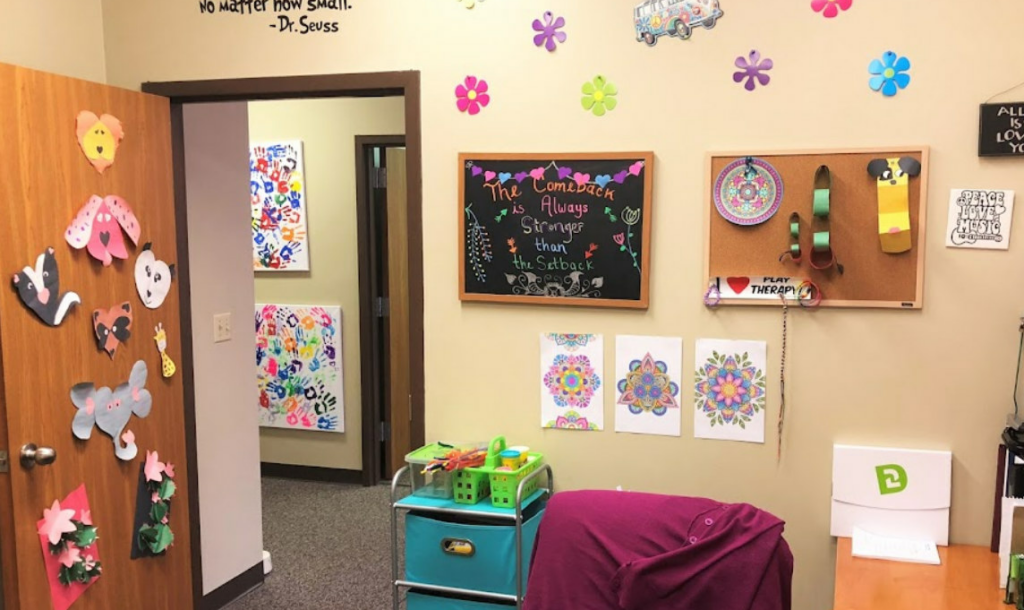
Child and Family Therapist Office
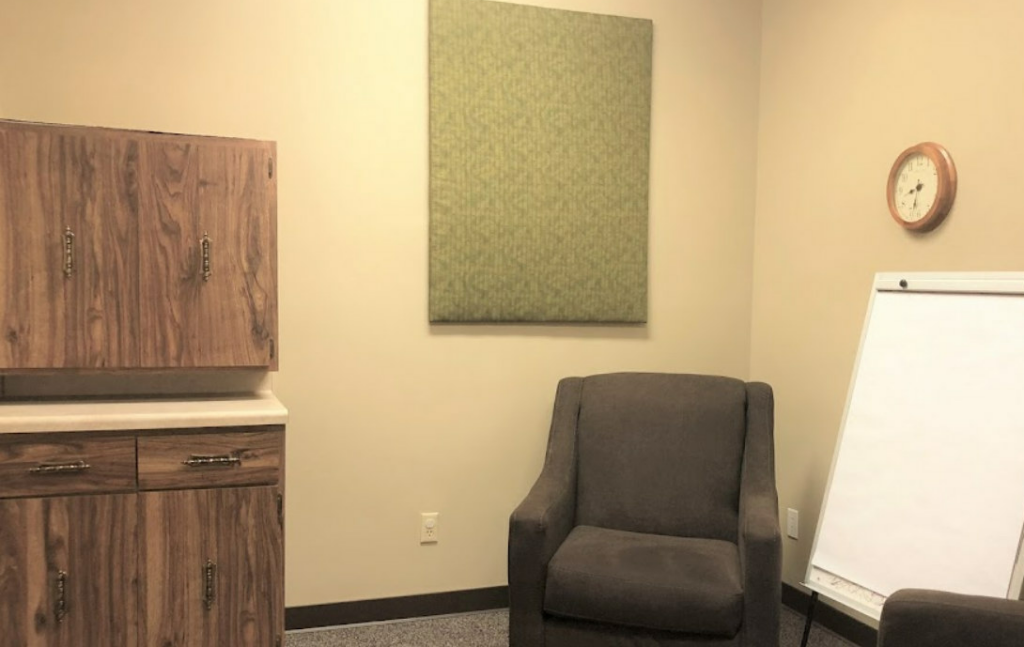
Child Interview Room
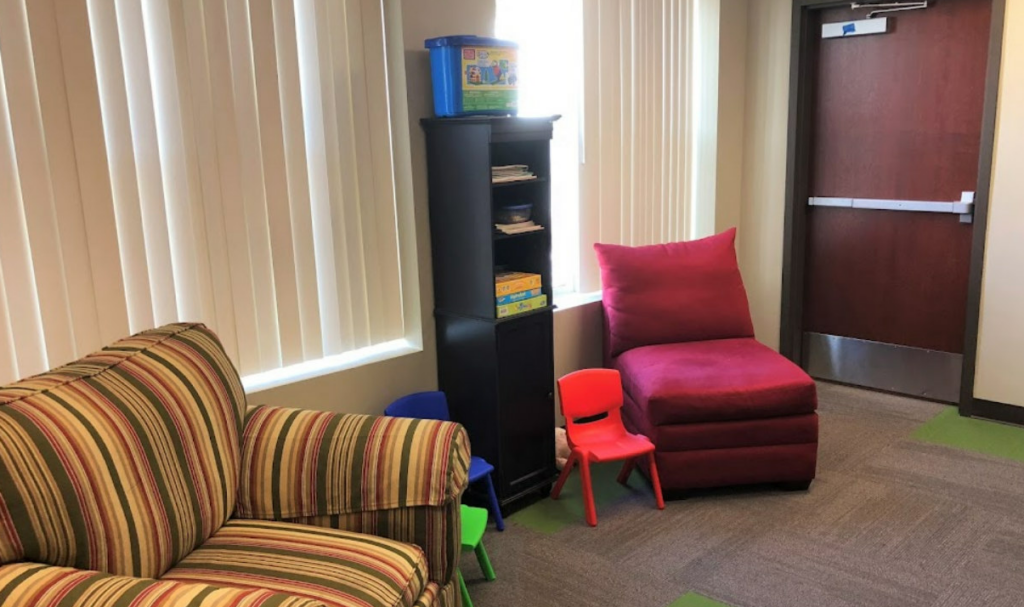
Child-Friendly Waiting Area
TEAMWORK
At present, the counties served by the CAC and similar agencies across the nation are faced with this reality: many of our children are being abused.
Each year, the CAC and its multidisciplinary team members investigate numerous cases of suspected physical and sexual child abuse while providing services to children and their families.
The CAC offers a coordinated, multidisciplinary intervention system involving agencies and the community.
- The Children’s Division
- The Prosecuting Attorney’s Office>
- Law Enforcement
- The Juvenile Office
- Medical Personnel
- Mental Health Professionals
- CAC Staff
- Community Volunteers
We are a part of a nationwide effort to reduce the trauma of abuse, so children are not re-victimized by the system designed to protect them.
In the past, victims seeking help faced multiple contacts with different community professionals, creating a maze of confusion for the child and family.
With the support of the community, the CAC enables the child to visit one location for safety, protection, and justice instead of going from agency to agency.
- Kimberly Kemerer – Executive Director
- Kelsey Christisen – Farmington Forensic Interviewer
- Haley Easley – Union Forensic Interviewer
- Autumn Colvis – Prevention Specialist
- Abby Manning – Festus Forensic Interviewer
- Bonita Hecktor- Union Family Advocate
- Amy Hall – Union Child & Family Therapist
- Stephanie Lane – Festus Child & Family Therapist
- Samantha Harris – Farmington Family Advocate
- Matt Lindemeyer – President – Missouri State Technical Assistance Team – Field Investigator
- Matthew Becker – Vice President –
Franklin County Prosecuting Attorney’s Office – Prosecuting Attorney - Karen Stetina – Secretary – Director Of The Child Protection Unit Jefferson County Juvenile Office
- Trisha Stefanski – Member – Jefferson County Prosecuting Attorney’s Office – Prosecuting Attorney
- Ms. Debra Thomas – Member – 42nd Circuit Juvenile Office – Deputy Juvenile Officer
- Lt. Gary Higginbotham – Member – Jefferson County Sheriff’s Office
- Ms. Dina Vitoux, LCSW – Member – Mental Health Counseling Concepts
- Captain Chuck Subke – Member – Franklin County Sheriff’s Office
- Dr. David Stansfield – Member – Physician Medical Services – Safe/Care Provider
- Ms. Cindy Vessell – Member – Senior Director of Community Services
- Melissa Gilliam – Member – St. Francois County Prosecuting Attorney’s Office – Prosecuting Attorney
- Det. Dustin Smith – Member – Farmington Police Department
- Ms. Mary Gorman- Non-Voting Member – Northern Region Children’s Division
LOCATIONS
442 FORENSIC INTERVIEWS IN 2021
889 MENTAL HEALTH SESSIONS IN 2021
FRANKLIN COUNTY PREVENTION PROGRAM REACHED 5,165 STUDENTS IN 2021
A Safe Place
A Safe Place
Viewing this website could place you in danger.
Computer use can be monitored and is impossible to completely clear searches.
Please ensure you are using a safe computer.
If you are in danger and do not have access to a safe computer, call our 24-hour crisis hotline at 636-232-2301 or call the National Domestic Violence Hotline at 1-800-799-SAFE.
If you are at a safe computer, read below for steps to stay safe.
Steps to Stay Safe
Use a safe computer at a library or community center. This is especially important when researching escape plans. Searching for bus tickets, shelter information, housing, or classified ads on a home computer can alert your abuser and increase your risk.
If you bookmark this or any other site about domestic violence, your abuser may see your computer activity. If you can, clear all web browser cache, cookies, and history. See instructions below for reducing risks.
Instructions for Internet Explorer
1. To delete temporary internet files, cookies (cryptic bookmarks that a Website can place on your computer to acknowledge your visit) and web addresses in your history:
2. On the menu at the top of the browser window, click on Tools>Internet Options…
3. In the dialog window that opens, click on the “General” tab.
4. In the section labeled “Temporary Internet Files”, if you wish to delete all files and cookies, click on the “Delete Files…” button. A confirmation dialog will open asking if you want to delete all files in your temporary internet folder. Click “OK.”
5. If you wish to selectively delete files and cookies, click on the “Settings…” button. A dialog window will open. Click on the “View Files…” button. A window will open with a list of all your temporary internet files and cookies. You can highlight the files you wish to delete and hit the delete key or click Edit>Delete.
6. To empty the History folder, click on the “Clear History” button and then the “OK” button.

A Safe Place
Domestic Violence Shelter
VISION:
A Safe Place Will Assure Survivors And Their Children A Comprehensive Treatment Process In A Safe And Secure Environment In Jefferson County.
MISSION:
To Provide, With Dignity And Respect, A Comprehensive, Quality Program Including Education, Therapy/Counseling, Shelter Advocacy, Accessibility, Referral Network, Etc. To Any Battered Survivor And His/Her Children.
TESTIMONIAL
Now… we are happy. We don’t have much, but we have each other, tons of good times and a sense of security. Life is good.”
SHELTER
A Safe Place is a residential shelter and program providing services to meet immediate needs of domestic violence survivors and their children. Abuse may be physical, sexual, emotional, verbal, psychological, or the destruction of property or pets..
Children who grow up in violent homes frequently learn violence as an acceptable means of resolving conflict or exerting control. These children are more likely to become victims or abusers as adults. A Safe Place provides a comprehensive program for the survivor and family, teaching healthy conflict resolutions and lifestyles.

Living Quarters
The emergency shelter accommodates six families in a community living home until they can support themselves or family.

Daily Activities
Residents share in daily activities and learn skills such as cooking, parenting education, and other life skills.

Goal-Based
Residents agree to a goal-based program which focuses on safety, healing, and financial independence.
KEY BENEFITS
Access to Care
Pets Referral Program
Referral & Resourcing
24-Hour Staff
Therapy, Counseling, & Coaching
Perpetrator Referral
SERVICES
Shelter Care
Survivors learn to break the cycle of violence through individual counseling, support groups, education, comprehensive parenting, fitness, and wellness programs. Feelings of dependency are replaced with self-sufficiency. Self-esteem, assertiveness, communication, and decision-making skills are taught, and assistance with nutrition, budgeting, housing, job searching, and career planning is provided. Additional services include:
- 24-Hour Crisis Hotline
- Emergency Shelter Program
- Residential Shelter Program
- Individual and Group Therapy
- Life Skills Group
- Domestic Abuse Education Group
- Court Advocacy
- Recreational Activities
- Child Play Therapy
- Art Therapy
- Crime Victims Advocacy
A Safe Place empowers survivors and their children to rise above the pain of domestic abuse and begin a safe and healthy life.
Community Groups
DOMESTIC VIOLENCE SUPPORT GROUP5
SEXUAL ASSAULT/ABUSE SUPPORT GROUP
These support groups, free and on-going, empowers survivors to rise above the pain of domestic abuse and begin a safe and healthy life.Learn from others’ experiences and support each other in the process of healing, change, and transformation.
Resources
Speak With Our Staff
Receive counseling, advocacy, referrals, and other services
636-232-2301
Missouri Coalition Against Domestic Violence
State-wide domestic violence resources and network
www.mocadsv.org
National Coalition Against Domestic Violence
National domestic violence resources and network
www.ncadv.org
Secret Financial Escape Plan
Steps to quietly build a credit history
https://www.nasdaq.com/articles/secret-financial-escape-plan-domestic-violence-victims-2014-12-29
If you know a friend of loved one who is being abused, consider taking these steps:
Set up a time to talk. Try to make sure you have privacy and won’t be distracted or interrupted. Let her know you’re concerned about her safety.
Be supportive. Listen to her. It may be very hard for her to talk about the abuse. Tell her that she is not alone and that people want to help.
Offer specific help. You might say you are willing to just listen, to help her with child care, or to provide transportation, for example.
Keep in mind that you can’t “rescue” your friend. She has to be the one to decide it’s time to get help. Support her no matter what her decision.
Let your friend know that you will always be there no matter what.
More Information:
Know the different warning signs of abuse.
Learn more ways to help a friend or loved one who is being abused.
Call the National Domestic Violence Hotline at 800-799-7233 or 800-787-3224 (TDD).
STORIES
A Safe Place is the only domestic violence shelter in Jefferson County.
A Safe Place was founded in 1987 to serve survivors of domestic violence. In 1998, the shelter opened at a new, undisclosed location to provide increased care and protection to the residents.
Looking to the future…
A Safe Place has expanded services by building Mary’s House of Hope at A Safe Place, a transitional housing complex with four apartment units for women and children preparing for independent life.
2021 Impact
- Received 1,226 hotline calls
- Served 1,1916 clients
- Turned away 1,022
- Offered 6,194 nights of safety
- Educated 263 individuals about domestic violence
- Assisted with 109 orders of protection
- Provided 101.25 hours of court advocacy for survivors
- Provided 541 hours of professional therapy
- Provided 357 hours of crisis intervention services
In 2004, I was involved in a custody case due to domestic violence. I worked with A Safe Place to create a plan that would allow me to get out. During my stay at the shelter, I received more resources and support than I could have ever imagined. My healing process began, and I was finally gaining confidence and peace I had lost so long ago. My girls also had a safe place where they could talk about their experiences and find healing.
When I left the shelter, I couldn’t afford a new place to call home. I had to go back to a former residence known by my abuser. Shortly after I moved, he broke into my home and assaulted me and my best friend, threatening both of us with a knife. Thankfully, I escaped without injury, but my friend was hurt. The police came and I filled out another restraining order. Because I didn’t feel safe staying there with my children, I was forced to move in with my family. I did not want to burden them and I feared for their safety, but I had nowhere else to turn.
If I had access to transitional, safe housing after my stay at A Safe Place, I would not have been assaulted again or placed my family at risk. A Safe Place played a huge role in my journey to freedom from the abuse. I am where I am today because of the services they provided me at such a crucial time in my life. I have since moved on to a successful career, safe home life, happy family, and healthy marriage. If transitional housing had been available, I know the next step in my journey would have been less traumatic.
The continued safety net of A Safe Place would have given me the additional leverage needed to confidently take those steps back into society. Had transitional housing been available, it would have given me the opportunity to safely establish the financial stability and structure needed for a fresh start. Transitional housing allows survivors to prosper while still feeling safe. I hope that other women find the strength and courage to leave their abusers, and that, with your support, they have the resources and the time to safely gain full independence and stability.
Mary’s House of Hope
Mary’s House of Hope
Viewing this website could place you in danger.
Computer use can be monitored and is impossible to completely clear searches.
Please ensure you are using a safe computer.
If you are in danger and do not have access to a safe computer, call our 24-hour crisis hotline at 636-232-2301 or call the National Domestic Violence Hotline at 1-800-799-SAFE.
If you are at a safe computer, read below for steps to stay safe.
Steps to Stay Safe
Use a safe computer at a library or community center. This is especially important when researching escape plans. Searching for bus tickets, shelter information, housing, or classified ads on a home computer can alert your abuser and increase your risk.
If you bookmark this or any other site about domestic violence, your abuser may see your computer activity. If you can, clear all web browser cache, cookies, and history. See instructions below for reducing risks.
Instructions for Internet Explorer
1. To delete temporary internet files, cookies (cryptic bookmarks that a Website can place on your computer to acknowledge your visit) and web addresses in your history:
2. On the menu at the top of the browser window, click on Tools>Internet Options…
3. In the dialog window that opens, click on the “General” tab.
4. In the section labeled “Temporary Internet Files”, if you wish to delete all files and cookies, click on the “Delete Files…” button. A confirmation dialog will open asking if you want to delete all files in your temporary internet folder. Click “OK.”
5. If you wish to selectively delete files and cookies, click on the “Settings…” button. A dialog window will open. Click on the “View Files…” button. A window will open with a list of all your temporary internet files and cookies. You can highlight the files you wish to delete and hit the delete key or click Edit>Delete.
6. To empty the History folder, click on the “Clear History” button and then the “OK” button.
If you know a friend of loved one who is being abused, consider taking these steps:
Set up a time to talk. Try to make sure you have privacy and won’t be distracted or interrupted. Let her know you’re concerned about her safety.
Be supportive. Listen to her. It may be very hard for her to talk about the abuse. Tell her that she is not alone and that people want to help.
Offer specific help. You might say you are willing to just listen, to help her with child care, or to provide transportation, for example.
Keep in mind that you can’t “rescue” your friend. She has to be the one to decide it’s time to get help. Support her no matter what her decision.
Let your friend know that you will always be there no matter what.
More Information:
Know the different warning signs of abuse.
Learn more ways to help a friend or loved one who is being abused.
Call the National Domestic Violence Hotline at 800-799-7233 or 800-787-3224 (TDD).

VIRTUAL TOUR
WHY WE EXIST
WITH YOUR DONATION, YOU CAN MAKE A DIFFERENCE FOR
THE WOMEN WHO DESERVE IT THE MOST, BUT HAVE THE LEAST
THE PROJECT
12 FAMILIES EMPOWERED TO TRANSITION TO INDEPENDENT LIVING
GOAL: To transition the women from the emergency shelter (A Safe Place) to independent living, free from violence and fear for one to two years at Mary’s House of Hope. $3.5 million is needed to complete the entire project.
MILESTONES:
- A groundbreaking ceremony was held on March 17, 2017
- Public water and sewer installed; site preparation is complete
- Funds raised utilizing NAP tax credits a year and a half early
- $1.5 million was raised to build and furnish the first home
- The first four families moved into apartments Fall of 2020
- The Circle of Hope campaign created to cover operational expenses
- Legacy of Hope Society Created – 2021
OUR IMPACT
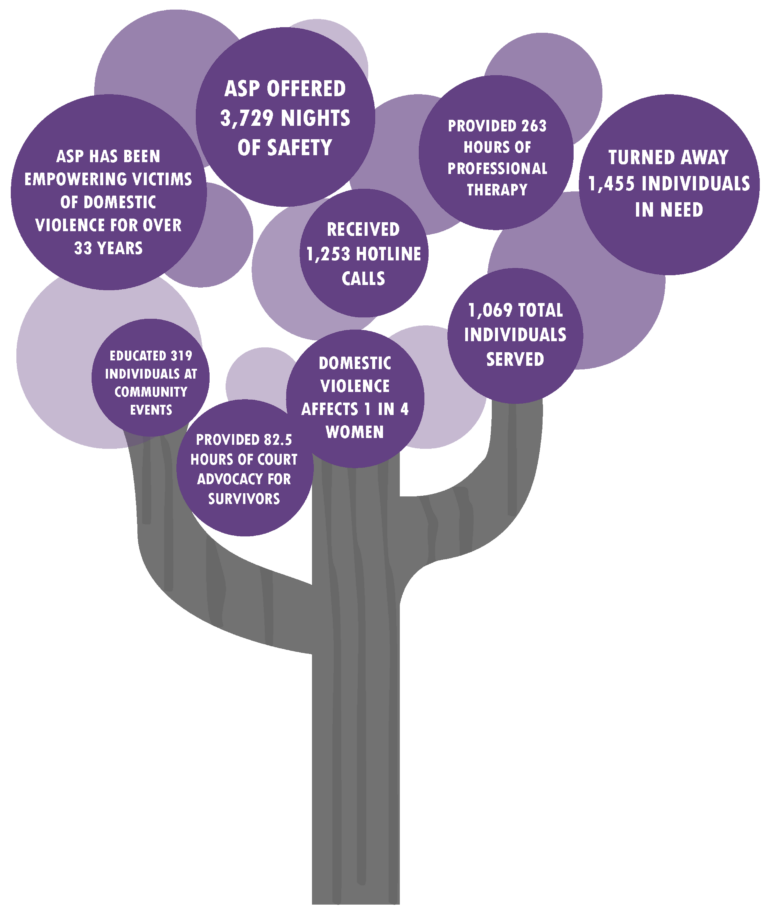
ABOUT THE PROJECT
For many of us, our home is the safest place we know, a personal sanctuary where we can retreat and relax. For survivors of domestic violence, though, their homes are not havens. Their homes are cocoons of fear. To escape the abuse, women and men, and their children, need a comprehensive program of education, therapy and counseling, court advocacy, and above all, a secure environment.
They need A Safe Place.
Our residential program is the only emergency shelter for domestic violence in Jefferson County. Serving the greater St. Louis area and surrounding counties, A Safe Place provides services to meet the immediate needs of domestic violence survivors including physical, sexual, emotional, verbal, psychological, or the destruction of property or pets.
While staying at A Safe Place, survivors learn to break the cycle of violence through individual counseling, support groups, education, and comprehensive parenting, fitness, and wellness programs. Over time and through work with a variety of providers,residents replace their feelings of dependency with self-sufficiency. They learn to build their self-esteem, and work on assertiveness, communication and decision-making skills. They receive assistance with nutrition, budgeting, housing options, job searches, and career planning, in addition to full primary care, dental care, and mental health services. Because every resident is unique, we offer individualized plans that coordinate all services, providing the optimal opportunity for each person to be restored to wholeness.
Adults aren’t the only victims of domestic violence. Children who grow up in abusive homes frequently learn violence as an acceptable means of resolving conflict and exerting control. These children are more likely to become victims or perpetrators as adults. A Safe Place offers assistance to these youngest survivors through counseling, recreational activities, child play therapy, and art therapy. A Safe Place also offers a Pet Protection Program to ensure domestic animal safety.
A Safe Place empowers residents and their children to rise above the pain of domestic abuse and begin a new, safer and healthier life, where they can transform from victim to survivor.
Why is the project called Mary’s House of Hope?
Mary Daniels was a woman from Hillsboro killed by her estranged husband in 2010. Mary’s family, friends, and supporters have raised over $100,000 for this project.
Who will manage the facility?
Compass Health Network will own and manage the facility. Mary’s House of Hope is being constructed on property adjacent to Compass Health Network’s A Safe Place.
How much is needed to complete the entire project?
$3.5 million
How many housing units will Mary’s House of Hope at A Safe Place Provide?
Each house consists of four units (one 1-bedroom unit, two 2-bedroom units, and one 3-bedroom unit). When all three houses are completed, there will be three 1-bedroom units, six 2-bedroom units, and three 3-bedroom units (total of 12 units). In addition, there will be three multipurpose rooms. A playground is adjacent to the housing facilities.
How long will a family reside in transitional housing?
A family can remain in a unit for up to two years. Residents will receive an individualized plan of action towards sustainable living, with staff oversight on measurable progress.
How will donors be recognized?
Donor recognition levels range from $1 to over $250,000. Donors will be acknowledged on COMTREA’s virtual donor wall. Additional donor recognition is dependent on amount of gift.
What is the project timeline?
The first housing complex is completed and we are continuing the campaign to raise funds for the remaining two units.
Is my donation tax deductible?
We are a tax exempt 501(C)3 organization and contributions are deductible to the extent of the law (please consult advisor).
What is the Circle of Hope?
Our Circle of Hope program supports sustainable funding of Mary’s House of Hope. These homes will continue to give hope far into the future. As each woman moves on to her own house, empowered and able to sustain herself and her family, the unit will be refreshed for another survivor looking to secure their independence.
Many effects of the 2020 pandemic are yet to be seen. The shelter in place orders given to protect society as a whole have only increased household tensions, especially those living with a violent partner or family member.
A Safe Place emergency shelter is now expecting a second surge; a surge of victims seeking shelter from abusers they have been locked down with during the past year.
The current lack of affordable housing offered in our area brings devastating consequences for those fleeing violent living conditions. Mary’s House of Hope will be on the forefront of the expected surge as we take next steps to build a second transitional housing unit. Families currently living in the first unit will continue to work towards their own individualized plan of action towards sustainable living.
Please consider supporting Phase 2 of Mary’s House of Hope to build four additional apartments for other families ready to transition out of A Safe Place emergency shelter.
You can be part of the foundation that builds a home for so many families seeking a safe and independent future.
CIRCLE OF HOPE
PROGRAM OVERVIEW
Your gift to the Circle of Hope program supports operational costs for Mary’s House of Hope at A Safe Place. These homes will continue to give hope far into the future. As each woman moves on to her own house, empowered and able to sustain herself and her family, the unit will be refreshed for other survivors looking to secure their independence.
FUND LIVING EXPENSES
MONTHLY & ONE-TIME DONATIONS
$50 monthly
$100 monthly
$250 monthly
$500 monthly
SPONSOR A FAMILY
MONTHLY COMMITMENT
$700 monthly (1-bedroom unit)
$800 monthly (2-bedroom unit)
$1,000 monthly (3-bedroom unit)
$1,250 monthly (3-bedroom unit and living expenses)
$2,083 monthly (Two 2-bedroom units and living expenses)
BUILD HOPE FOR SURVIVORS
Mary’s House of Hope is supported by financial gifts, grants, volunteer time and services, and donations of supplies.
Donations are tax-deductible to the extent of the law.
LEGACY OF HOPE
HOW TO LEAVE AN IMPACT
Giving through your will is easy, and no amount is too small. There are many options that can be tailored to your needs.
- Leave a monetary amount in your will or trust
- Provide a gift of real estate
- Transfer stocks and business holdings
- Donate retirement assets or IRA rollover
- Gift life insurance funds
- Designate annual interest earnings
- Set up an endowment
Charitable Wishes
Your financial advisor can help legacy gifts exist side-by-side with other beneficiaries and family priorities. We’ll help you find the best fit for your gift so it creates a permanent impact.
Financial Planning
Each type of charitable gift has varying tax laws and flexibility. Every situation is different; please discuss with your financial advisor or attorney the best plan for you. COMTREA does not provide financial or legal advice.
Click here to download a fillable pdf form. Once completed, mail or email the form to:
Compass/MHOH
ATTN: Legacy of Hope
227 East Main Street
Festus, MO 63028

25 Days of Ways to Deal with Family Dynamics Around the Holidays
25 Days of Ways to Deal with Family Dynamics Around the Holidays
The countdown to the holidays has begun! And while it may be the most wonderful time of year, family dynamics can also make it the most stressful time of year.
What is family dynamics? If you’re looking at a basic family dynamics definition, it’s about the interactions and factors that shape them with relatives. However, knowing the family dynamics meaning isn’t enough.
From healthy to narcissistic family dynamics, it can be a challenge during the holidays for anyone. Keep reading for tips on how to deal with your family this holiday season.
December 1-5: Don’t Burn Out
As December begins, calendars quickly fill up. It’s crucial to prioritize gatherings so you don’t burn out faster than chestnuts roasting over an open fire.
Here are a few things to remember as the party and open house invitations begin to roll in:
- Remember it’s okay to say no.
- Know when to say no.
- Turn off your phone if you’re tempted to cave into the pressure.
- Don’t let social media overwhelm you.
- Talk to your therapist about setting and maintaining boundaries.
December 6-10: Can Someone Make Those Drummers Stop Drumming?
The music and lights around the holidays can quickly become overwhelming for people with sensory issues. Know how to protect yourself before enjoying Christmas lights with your family.
- March to the beat of your own drum! (Noise-canceling headphones with music that relaxes you).
- Be the cool kid with sunglasses. (Block out excessive light).
- Practice self-calming exercises and remember that routine exercise dramatically helps with managing stress. (mindfulness, coloring, fidget toys, etc.).
- Santa doesn’t come unless you’re asleep. (get enough sleep).
- Find a safe space and take a break!
December 11-15: Know When to Stay and When to Go…
The weather outside may be frightful, but knowing when to go is essential, even if it is snowing. Time to yourself is as vital as time with friends and family (think of it as a gift to yourself)!
- Take a walk (but don’t get run over by a reindeer).
- Make a craft (make your own decorations and ornaments).
- Read a book (or take a nap while pretending to read a book).
- Treat yourself to a coffee date (peppermint mocha, anyone).
- Spend time journaling (write what you are feeling, it’s therapeutic).
December 16-20: Holiday Party Woes
Eating cookies and candy may be fun, but it also may encourage you to overindulge if you have social anxiety.
- Drink decaf peppermint mocha (cut down on the caffeine).
- Challenge yourself to face your fears (even if you must wear an ugly sweater).
- Reframe your thoughts (think of your happy place rather than consuming excess sugar).
- We won’t tell anyone (hide in a safe space to take a break).
- Keep your mind and hands busy (cooking, football, games, etc.).
December 21-25: Embrace the Days the Best You Can!
Do they know it’s Christmas time at all?
- Avoid controversial topics (politics are a no-no).
- Set a time limit on visits (it’s less stressful if you know what time you will leave).
- Don’t deny your feelings (even if it’s a Blue Christmas, do you have a professional that you can talk to)?
- Protect your holiday (choose to spend it with just your immediate family).
Conquer Challenging Family Dynamics
Family dynamics can be a challenge during the holidays. We’re here to help.
At Compass Health Network, we believe in moving beyond health to a wellness lifestyle. We’re committed to meeting the unique needs of our community. Contact us to get started with mental health services.
